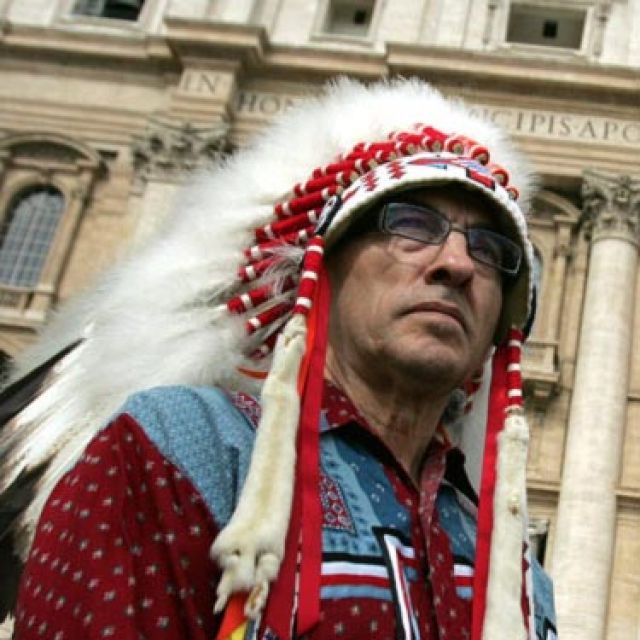Native leader loses track of the facts at St. Kateri’s canonization
The making of saints is a joyous affair, with a gracious spirit abounding toward all, and a determined effort to ignore any discordant notes. I recall, for example, at the beatification Mass for Cardinal John Henry Newman my surprise at seeing Bishop Remi De Roo, the retired bishop of Victoria, sitting not a few paces away from Pope Benedict XVI. Bishop De Roo had been keeping a determinedly low profile since leaving his diocese plagued by financial scandal, so it was a surprise to see him at all.
Yet there he was, ebullient at Newman’s beatification, taking the great cardinal as inspiration for his own theological vision. The Holy Father, for his part, was inspired enough by Newman that he departed from his usual practice and conducted the beatification himself. Between Benedict XVI and Bishop De Roo there is a vast difference as to the proper interpretation of the Second Vatican Council and other theological matters, and the former would be astonished that the latter would claim Newman for his positions. But it was a beatification, the saints belong to the whole Church, and so the gracious thing to do was not to notice the incongruity of it all.
It is inevitable that new saints are used for partisan purposes by various factions in the Church. Sometimes the Holy See attempts to forestall the attempt to use the saints in this fashion, as for example when Pope John XXIII and Pope Pius IX were beatified on the same day, or when Pope John Paul II and Pope Pius XII were declared venerable on the same day.
The canonization of Kateri Tekakwitha on Oct. 21 was characterized — wittingly or not — in such factional terms by Phil Fontaine, former national chief of the Assembly of First Nations, who was present in Rome for the canonization. Fontaine had been in Rome in 2009, accompanied by Canadian bishops, to receive an apology for the treatment of native children in residential schools. So he speaks with some authority on relations between native peoples and the Catholic Church. But what he said in Rome cannot go unremarked.
“(The canonization) makes it possible, very much possible, to bring our community — the First Nations — very much closer with the Catholic Church. There was rupture for too long,” he told Catholic News Service.
“The canonization makes it possible to share our daughter with the universal Church,” he continued. “If you link the two events (the 2009 visit and the canonization), it is all about imparting reconciliation. It is an opportunity for us to say, ‘We accept your apology, we forgive, and so now let us begin taking the important steps of healing and reconciliation.’ ”
Healing and reconciliation need to be rooted in truth, and what Fontaine said is not rooted in the truth of Kateri’s life. Kateri’s choice to be baptized and practise her Catholic faith meant that her own people persecuted her, so much so that she left her native village in present-day upstate New York and moved to the Christian mission near Montreal, where she died at age 24.
As to whether she belongs to her native tribe or the universal Church, the answer is that she belongs to both. But if she was forced to choose, it is clear that Kateri would have chosen her faith. In fact, that is what she did at considerable cost.
More objectionable is Fontaine’s treatment of the canonization as a sort of super-apology, as if the Church gave native Canadians a saint to compensate them for their suffering. That would make Kateri an instrument of factional jockeying rather than a model of holiness. Moreover, it neglects the fact that in the complex history of the Church and native peoples, Kateri is an example of native persecution of Christians, not the other way around.
“St. Kateri was persecuted for the faith she held so tenaciously,” Prime Minister Stephen Harper said in his statement. The prime minister did not mention who persecuted her. Good manners today mean that we don’t mention the aboriginal peoples who made martyrs — sometimes brutally so — of Christians, but an objection must be made when Kateri is advanced as an occasion of “accepting” an apology from the Church. The truth of history is exactly the opposite.
Fontaine was a discordant voice in his remarks to Catholic News Service. Most voices — aboriginal and otherwise — did not see this as the latest installment of an ongoing conflict between natives and the Church, but a blessing for both. It was, and St. Kateri may well obtain from God the gift of reconciliation for the First Nations peoples, but reconciliation requires first that the truth be told.


